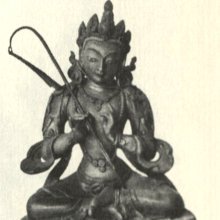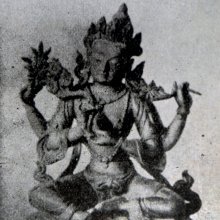Vayudeva, Vāyudeva, Vayu-deva: 4 definitions
Introduction:
Vayudeva means something in Buddhism, Pali, Hinduism, Sanskrit. If you want to know the exact meaning, history, etymology or English translation of this term then check out the descriptions on this page. Add your comment or reference to a book if you want to contribute to this summary article.
Images (photo gallery)
In Buddhism
Tibetan Buddhism (Vajrayana or tantric Buddhism)
Source: archive.org: The Indian Buddhist IconographyVāyudeva (वायुदेव) is another name for Vāyu: one of the eight Dikpālas, commonly depicted in Buddhist Iconography, and mentioned in the 11th-century Niṣpannayogāvalī of Mahāpaṇḍita Abhayākara.—His Colour is blue; his Vehicle is the deer; he has two arms. [...] Under Vāyudeva his statuette occurs in the Chinese collection

Tibetan Buddhism includes schools such as Nyingma, Kadampa, Kagyu and Gelug. Their primary canon of literature is divided in two broad categories: The Kangyur, which consists of Buddha’s words, and the Tengyur, which includes commentaries from various sources. Esotericism and tantra techniques (vajrayāna) are collected indepently.
Languages of India and abroad
Sanskrit dictionary
Source: DDSA: The practical Sanskrit-English dictionaryVāyudeva (वायुदेव).—the lunar mansion स्वाति (svāti).
Derivable forms: vāyudevam (वायुदेवम्).
Vāyudeva is a Sanskrit compound consisting of the terms vāyu and deva (देव).
Source: Cologne Digital Sanskrit Dictionaries: Monier-Williams Sanskrit-English DictionaryVāyudeva (वायुदेव):—[=vāyu-deva] [from vāyu] n. the lunar mansion Svāti (presided over by Vāyu), [ib.]
[Sanskrit to German]
Sanskrit, also spelled संस्कृतम् (saṃskṛtam), is an ancient language of India commonly seen as the grandmother of the Indo-European language family (even English!). Closely allied with Prakrit and Pali, Sanskrit is more exhaustive in both grammar and terms and has the most extensive collection of literature in the world, greatly surpassing its sister-languages Greek and Latin.
See also (Relevant definitions)
Partial matches: Deva, Vayu, Teva.
Starts with: Vayudevata.
Full-text: Rana, Vayu, Shilada, Tiruchendur.
Relevant text
Search found 7 books and stories containing Vayudeva, Vāyudeva, Vayu-deva, Vāyu-deva; (plurals include: Vayudevas, Vāyudevas, devas). You can also click to the full overview containing English textual excerpts. Below are direct links for the most relevant articles:
The Indian Buddhist Iconography (by Benoytosh Bhattachacharyya)
Animal Kingdom (Tiryak) in Epics (by Saranya P.S)
Puranic encyclopaedia (by Vettam Mani)
The Brahmanda Purana (by G.V. Tagare)
Chapter 2 - The Legend of Naimiṣāraṇya < [Section 1 - Prakriyā-pāda (section on rites)]
The Devi Bhagavata Purana (by Swami Vijñanananda)
Chapter 10 - On the description of Maṇi Dvīpa < [Book 12]
Chapter 1 - On the description of Prakṛti < [Book 9]
Temples in and around Madurantakam (by B. Mekala)
Atcheeswarar Temple at Acharapakkam < [Chapter 4 - Prominent Temples in Madurantakam Taluk]


